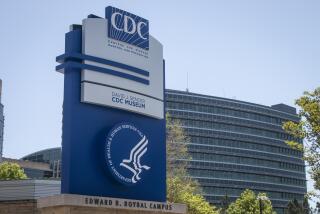U.S. Wants Hospice to Repay Medicare Funds
- Share via
WASHINGTON — The federal government, extending its financial investigation of hospice programs to California, wants San Diego Hospice to refund $2.1 million to Medicare for 37 patients who outlived the normal six-month prognosis for dying people in terminal care.
Government auditors looking for fraud in the Medicare program are seeking more than $80 million in repayments from a dozen hospice programs across the country for patients who lived more than six months, the standard length of the hospice benefit.
The audit of the San Diego program, completed this week, was the first investigation in California in which the government is seeking repayment. The hospice officials are angry, claiming that the government is unreasonable in expecting them to have a perfect record of predicting death.
“We want to make sure people know we are not ripping off the government,” said Dr. Laurel Herbst, the medical director of San Diego Hospice, a nonprofit organization. “I know it is the job of government auditors to find stuff . . . but this just isn’t common sense.”
The government strongly disagrees. “We want to make it clear we are not faulting anyone for guessing wrong,” said George Grob, deputy inspector general for the Department of Health and Human Services, which conducted the audits.
In the disputed cases at San Diego and other hospices, the patients “did not have a prognosis of six months to live when they entered the hospice program,” Grob said. He added that the program “is only available to those who are facing death within six months.”
Therefore, the patients “were never eligible to begin with,” Grob said.
The argument pitting the San Diego group and other hospice officials against the government auditors focuses on sensitive emotional and medical issues dealing with care of the dying.
Hospice officials claim that the auditors--and the doctors hired by the government as reviewers of patient records--do not understand hospice issues and the difficulty of predicting death with any degree of certainty.
“Unlike cancer patients, for whom hospice care generally does not extend the patient’s life expectancy, good hospice care can and often does extend the lives of patients with non-cancer terminal diseases, including AIDS and end-stage organ diseases,” Herbst said.
By asking for refunds, she said, the government “effectively punishes us for doing a good job.”
San Diego Hospice cared for 3,250 patients between 1993 and 1996. The government reviewed the records of 78 beneficiaries enrolled in hospice who lived more than the normal duration of the hospice benefit.
The inspector general’s report, issued March 13, said that 37 of the beneficiaries were ineligible because they were not facing death within the time frame for hospice benefits and that $2.1 million should be repaid.
In another 19 cases, for which the hospice was paid $1.9 million, “we were unable to conclusively determine that the beneficiary was terminally ill,” June Gibbs Brown, the inspector general, said in a memo to the Health Care Financing Administration, which runs Medicare. Medical reviews of these 19 cases should be conducted to determine whether money should be refunded, she wrote.
The hospice benefit was written into law by Congress to help the terminally ill and their families find comfort and care. It also saves the taxpayers money, costing $96 a day, just a fraction of the cost of daily hospital care for major ailments.
About 400,000 people a year are cared for in the nation’s hospice programs, about 90% of them at home. Medicare pays for nurses, home health aides, social workers and others to help both the patient and family members. Counseling, for example, may be available for a survivor up to a year after the death of the person enrolled in hospice. The hospice benefit also pays for prescription drugs and equipment such as wheelchairs and walkers.
In return for the hospice benefit, the patient surrenders the right to regular Medicare hospital and doctor treatments for the terminal illness. Hospice offers two 90-day benefit periods, a 30-day period, and a fourth open-ended benefit.
The vast majority, more than 90% of those enrolled in hospice, die within six months.
The audits of hospice programs were carried out as part of Operation Restore Trust, a government investigation to combat Medicare waste and fraud in California, New York, Illinois, Texas and Florida. The effort eventually will extend to all 50 states, HHS has announced.
More to Read
Inside the business of entertainment
The Wide Shot brings you news, analysis and insights on everything from streaming wars to production — and what it all means for the future.
You may occasionally receive promotional content from the Los Angeles Times.










